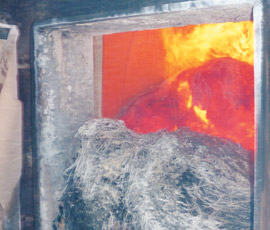Biomass boilers fit the bill – but plan projects carefully

Modern biomass technology is very much in its infancy, so new projects must be carefully planned to avoid any pitfalls.
The first consideration, according to Kate Hutchinson, biomass energy consultant at the Scottish Agriculture College, is to ascertain what type of fuel will suit you best.
“Just because you have one type of fuel available on the farm doesn’t mean it is the right choice for you – you need to fully understand the pros and cons of each system.” For example, while solid wood may be freely available, it requires frequent manual loading, so opting for an automated pellet boiler may be better.
Fuel storage and delivery is another important factor, as is choosing an experienced manufacturer and installer. “It is a good idea to go with someone that has a good track record; because it’s a new industry there are lot of companies starting up that have no real experience.”
To qualify for the Renewable Heat Incentive, farmers must ensure the boiler, installer and final use are eligible, she adds. “If it’s less than 45kW, both the boiler and installer must be accredited with the Microgeneration Certification scheme.”
Boilers smaller than 200kW cannot be registered for the RHI until they are installed and commissioned, so investors must ensure the boiler qualifies before proceeding. “Once it’s up and running it’s a bit late to discover it’s not eligible.”
Currently, only non-domestic projects qualify for the RHI, which means the boiler must be heating a business premises or more than one separately-rated household. “If you’re heating a workshop and the farmhouse, check that the workshop is not considered to be part of the house for council tax banding.” Biomass must also be the primary fuel source – so multi-fuel boilers will not qualify.
Biomass boilers can also be used for grain dryers, but a lack of definitive guidance means it can be difficult to comply with the regulations, says Miss Hutchinson. “The heat must be used in a wholly enclosed building, so open-sided tray dryers wouldn’t be eligible.” The boiler must also heat water rather than simply producing hot air, so it will require a heat exchanger and fans.
“Getting independent advice at the early stage of planning is very valuable, but because the industry hasn’t been going for very long there aren’t very many experienced consultants out there,” she adds.
Although the RHI application should take six weeks for Ofgem to approve, they often require additional information, which delays the whole process.
“Make sure you allow plenty of time for every stage – installers are very busy, so there can be unforeseen setbacks at any time.”
Case Study: John Seed, Duns, Scottish Borders
John Seed installed a biomass boiler at Woodend Farm, Duns, in the Scottish Borders, last year to power the farm’s grain dryer. “I wanted to stop the haemorrhaging of cash on heat and power, with a system that would suit an arable enterprise.”
With 200ha of cereals, he powers the 450kW boiler with 170t of oilseed rape straw a year – although it can also burn woodchip and other biomass fuels. Solar panels also provide electricity for the farm.
“It’s been fairly simple to replace the boiler, but it’s been quite a job getting the RHI because we are all learning as we go along.” By passing the exhaust gases from the boiler through the accumulator tank, Mr Seed has increased the overall boiler efficiency to 88%.
He has replaced the old continuous flow dryer with an on-floor system with ducts and grain stirrers, but says a new building isn’t essential. “These drying systems can be easily retrofitted to many grain stores.” The ash from the boiler is applied as a soil conditioner, helping to reduce fertiliser bills.
As well as the grain dryer, the boiler heats the farmhouse, offices, cottages and, soon, a new poultry business. Installing the correct metering to meet RHI requirements has been particularly time consuming, but it will certainly be worth it.
“In 2011 we saved £38,500 in gas and heating oil, and we expect to receive RHI payments of £25,000 a year. The Overdahl system, district heating and central heating systems cost around £250,000, while the on-floor grain dryer cost a further £95,000, so we are looking at a payback of around seven years.”
RHI biomass boilers
- Plan projects carefully
- Allow plenty of time for every stage – installers are busy and setbacks often delay projects
- Fuel choice – not just a matter of availability – consider handling practicalities and suitability also
- Look at track record of supplier, manufacturer and installer
- Check RHI requirements – size and type of project, deadlines
- Multi-fuel boilers do not qualify for RHI – biomass must be primary fuel source
- RHI application should take six weeks but Ofgem often requires additional information, causing delays

